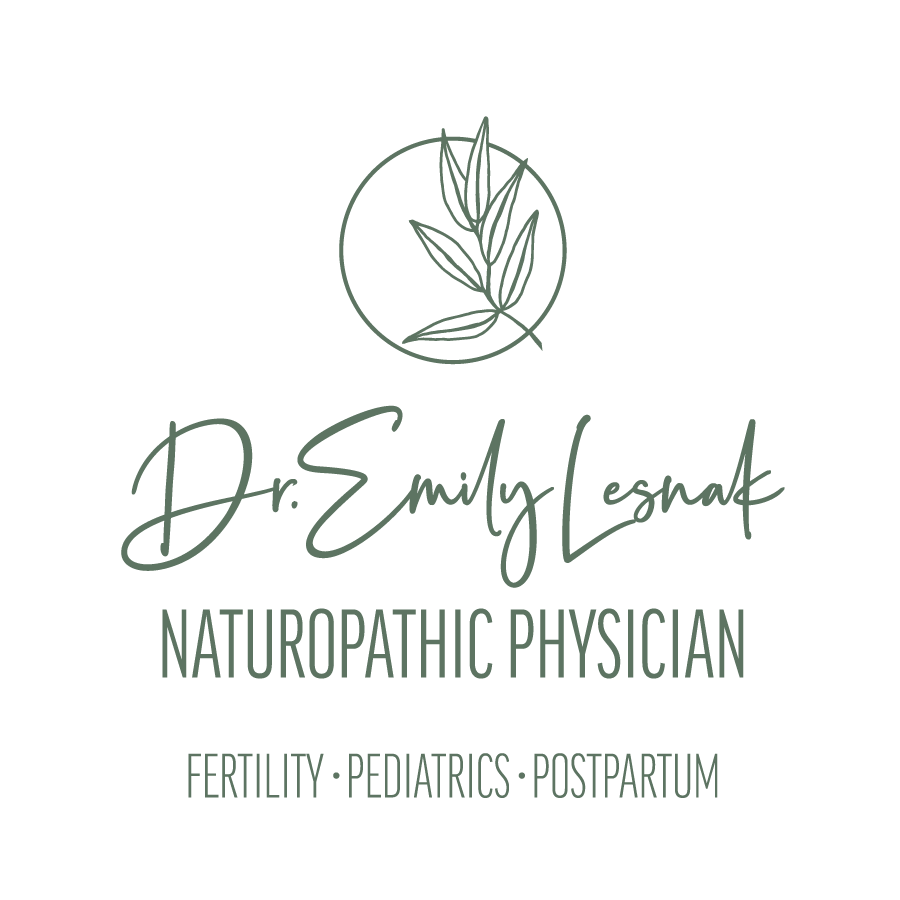Part one of this series reviewed the common symptoms of polycystic ovarian syndrome (PCOS) , how it is diagnosed, and how PCOS can cause infertility. Make sure you read the first part if you need a refresher before we dive right into my favorite natural treatments for PCOS.
Lifestyle treatments:
Lifestyle habits cannot be underestimated when treating infertility and PCOS. There is a saying that you cannot out-supplement a poor lifestyle and that is so true!
Adequate sleep allows hormones to “reset”. Cortisol, our body’s stress hormone, is primarily controlled the circadian rhythm of our sleep cycle. So, if our sleep cycle is off, like going to bed at different times, staying up late, or sleeping in, then our stress hormone will be dysregulated. When cortisol is off balance it can impact the production of other hormones, like LH, FSH, and progesterone, all important for having a normal menstrual cycle.
Regular exercise or movement helps to improve insulin resistance and has been shown to improve the rate of ovulation. Exercise also helps one to sleep better and decreases stress, both important for normal hormonal production.
Eating a diet that includes foods rich in antioxidants, like lots of colorful fruits and veggies, can help to improve egg quality. Maintaining a healthy weight helps to improve insulin resistance and a diet that is well balanced will make sure this happens.
Supplemental support:
Many women that I see are already managing their sleep, diet, and exercise in a way that is supportive to their hormones. A few of my favorite supplements for extra hormonal support are detailed below. But remember, you cannot out-supplement a poor diet, lack of sleep or exercise!
Inositol
Inositol, or more specifically, myo-insoitol, works by helping insulin to send a message to the ovaries to facilitate progesterone production. And we need progesterone for ovulation and regular periods.
Inositol has also been found to improve egg quality, decrease blood pressure, and decrease unnecessary androgen hormones like testosterone and DHEA.
N-acetyl-cysteine (NAC)
NAC is made from the amino acid cysteine and amino acids are what make up the proteins in our body. NAC has been shown to improve fasting blood sugar and fasting insulin better than prescription medication metformin. Supporting insulin function is important for progesterone production in the ovaries. This amino acid has also been found to improve hormone function and treat women who don’t ovulate, especially when traditional fertility medications like clomid don’t work well for them.
NAC is also used as a mucolytic, meaning that it thins mucus, and this includes thinning cervical mucus, which can make it easier for sperm to swim to the egg.
Paeonia and Glycyrrhiza
This is a classic Chinese base formula used to treat PCOS. Glycyrrhiza (herbal licorice) has been shown to lower testosterone by helping to convert extra testosterone to estrogen in the ovary. Herbal licorice has the ability to improve elevated FSH levels (follicle stimulating hormone). Paeonia (peony) works similarly by decreasing testosterone production from the theca cells in the ovary. I use a combination herbal capsule of these two herbs when wanting to decrease elevated testosterone and improve ovarian function.
References:
Javanmanesh F, Kashanian M, Rahimi M, Sheikhansari N. A comparison between the effects of metformin and N-acetyl cysteine (NAC) on some metabolic and endocrine characteristics of women with polycystic ovary syndrome. Gynecol Endocrinol. 2016;32(4):285‐289.
Kite C, Lahart IM, Afzal I, et al. Exercise, or exercise and diet for the management of polycystic ovary syndrome: a systematic review and meta-analysis. Syst Rev. 2019;8(1):51. Published 2019 Feb 12.
Leproult, R., & Van Cauter, E. (2010). Role of sleep and sleep loss in hormonal release and metabolism. Endocrine development, 17, 11–21. https://doi.org/10.1159/000262524
Nemati M, Nemati S, Taheri AM, Heidari B. Comparison of metformin and N-acetyl cysteine, as an adjuvant to clomiphene citrate, in clomiphene-resistant women with polycystic ovary syndrome. J Gynecol Obstet Hum Reprod. 2017;46(7):579‐585.
Ong M, Cheng J, Jin X, et al. Paeoniflorin extract reverses dexamethasone-induced testosterone over-secretion through downregulation of cytochrome P450 17A1 expression in primary murine theca cells. J Ethnopharmacol. 2019;229:97‐103.
Song Y, Wang H, Huang H, Zhu Z. Comparison of the efficacy between NAC and metformin in treating PCOS patients: a meta-analysis. Gynecol Endocrinol. 2020;36(3):204‐210.





